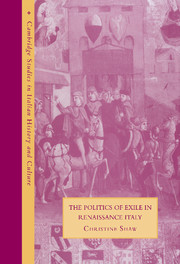5 - Keeping track
Published online by Cambridge University Press: 31 July 2009
Summary
A regime's interest in its political exiles did not end when they left. It might aspire to control what they did, or at least to exert some influence over them. If this was not possible, it was still desirable to know where they were and what they were doing. How much effort would be put into keeping track of them would obviously vary with the resources available to a regime, and the perceived dangerousness of the exiles. How effective attempts to monitor, even control, the activities of exiles could be, would depend to a great extent on the cooperation of other states and their officials. Even trusted allies could be ambivalent in their treatment of the exiles of their friends, and were sometimes unwilling to treat as suspects, let alone enemies, men who had been in power and who might return to power in the future. The behaviour of neighbouring states, allies or not, could be more unpredictable still.
Governments had a variety of means at their disposal to aid them in controlling or keeping track of their exiles. There was the straight-forward threat of sanctions for disobedience, either against the exile, who could be given a harsher sentence or be made a rebel, or against their property, which could be subject to fines or punitive taxation, or outright confiscation. Exiles might be required to report at regular intervals to the authorities of the place where they had been sent, and they might be forbidden to communicate with one another.
- Type
- Chapter
- Information
- The Politics of Exile in Renaissance Italy , pp. 143 - 171Publisher: Cambridge University PressPrint publication year: 2000
- 1
- Cited by

